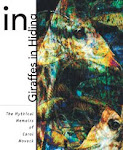Interview of the innovative writer, Frederic Tuten, re "contemporary" fiction. Comments welcome!
from FENCE Vol. 8 nos. 1 and 2, Summer 2005.
The Talking Cure: Contemporary Fiction and Its Critics
Frederic Tuten
Recently, a spate of public discussion about directions in contemporary fiction has centered on historical models-what the novel was and should be, still-kinds of, and lack of, criticism, and market pressures. Following up on this conversation, and what may he below its surface, we asked a group of contemporary fiction writers and critics the following questions:
'What questions and issues would you like to see addressed about contemporary fiction?
'Is the critical and review establishment in any way assisting the discourse around and the production of fiction?
"What do you think needs to be done differently, if anything, or what needs to exist that doesn't now?
'MFA programs, publishers and marketing, money, movies, the Internet-all of these and more affect the writing of fiction and its distribution. Since the 19th century, other media have been said to draw from, and also away from, the novel. Let's say: "all things being equal," what are your greatest concerns and worries about fiction's viability and vitality?
'What part do you think contemporary fiction plays in culture generally? How do you see art and politics in contemporary fiction?
I'm partial to fiction that does not compete with TV, with movies, with the Internet, does not compete with the mass market novel. All those things have their place and do their job, to entertain their audience, among whom I am willingly one. Life has many pleasant and various distractions, as does the house of fiction, which, as Henry James says, has many windows.
The truth is that 1 would rather see even the thinnest episode of The Sopranos or almost any half hour of Blind Date than read most contemporary fiction of the kind which tells the story blow by blow, in well-pressed sentences, stories which can be better and more excitingly told in another medium and which are really fodder for movies and TV. The writing I'm interested in exists for itself and of itself and is virtually untranslatable to another medium. Read, for example: Nightwood; Barkree; Gold Fools; This Is Not A Novel. In any case, to rail against the pernicious influence of the media on art is to beat the sea with chains.
I'm interested in writing that spins on itself, dives inward, twists the guts of language and makes it sing new songs, whole operas, even unstageable ones. Writing born from no preordained mould or schoolish preconception of what a novel or a story is or should be. These are the books that will take us out of the commonplace and into the rare, places heaven to visit when the world seems choked to the eyes with lies.
We complain, and not without justice, that we are in a culture that does not care whether we live or die, whether we write or do not write, except as we produce fodder for this or that vast conglomerate. So what?
If you want to produce fodder, produce it. If you want to concern yourself with the overarching problems of publishing in an increasingly illiterate, reactionary society, concern yourself. If not, in the meanwhile, consider this:
Think small, not the blockbuster, the breakout book and the mega audience, but the gem that cannot be replicated. Think of the few but wonderful readers who love gems. Think of poetry. Think of incandescence and radiance. Leave the careerists to their careers. Ignore them as you would collaborationists. Shun all teachers of the safely banal; exit rapidly those writing schools that chum out the Stepford Realists. Explore the still unexplored territory of the ever-protean novel, live within it, explode it, reinvent it, create new vistas accessible only on its unique terrain.
Embrace writers with integriry. Write to them as if they were alone on a far away island or in a prison, isolated and dying for an appreciative word. Visit the graves of unhonored writers; ditto their places of birth and last residence. Leave them flowers and books and a thank you note, handwritten. (A good start: Djuna Barnes's home at
Think of yourself as making art-however bombastic or vague that may sound cvcn to you-and not as a producer of product or units: You will thus relieve yourself of worrying about your work's social or political function, since all art is redemptive, salvational, ennobling and is a protest against ignorance, crime, lies, and Death.
One beautiful story is more useful than all the palaver of well-intentioned (leaving aside the self-promotional aspect and travel advantages for the participants) literary panels on the role of art in society. One beautiful novel shames all banal enterprises and sends brightness through the windows of prisons, parliaments, and publishing houses.
Think of the legacy of shit you leave the world when you write shit; think of the gift of grace you give to your soul and to the souls of others when you do not. Think (I tell myself) of not being afraid. When we know and do our true work, all our complaints will disappear, as will their cause.
Contemporory Fiction and Its Critics 229












No comments:
Post a Comment